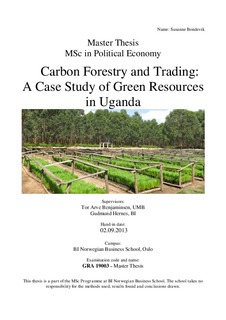| dc.description.abstract | This study was conducted in Norway and Uganda. The objective was to investigate the carbon forestry markets using Green Resources AS as an example. Green Resources is an interesting case because it is one of the largest companies engaged in carbon forestry at the African continent.
The main problem discussed in the thesis is: What are the challenges of forestry carbon markets, and are they reflected in Green Resources’ projects in Uganda?
By using features from neoliberalism and institutionalism, I explain why forest carbon markets have been more successful in the voluntary than in the compliance market. I also look at the forest carbon market’s challenges with concern to prices and certifications, in addition to some of the perceived benefits and challenges such projects face. The last section of the analysis focuses on Green Resources’ plantations in Uganda and serves as an example of some of the challenges carbon forestry projects face “on the ground”. Different institutional arrangements influence GRAS projects and are believed to have an impact their business strategy.
In order for the reader to grasp the background for the creation of carbon markets, additionally to which markets that exist and how they function, a thorough presentation is given in the parts before the methodology chapter. Neoliberal theory provides the basic understanding for why a market solution to the climate problem was chosen. Central features in market creation are property rights and commodification of the carbon credits.
The methodology used in this thesis is qualitative and based on interviews, literature review, various reports and observation.
The results from the study show that policy processes by and large influence the market as new institutionalism emphasize. Also features from neoliberalism and critical institutionalism explain the actual results we see in the carbon markets today. Green Resources face typical challenges in carbon forestry markets. With regards to socio-economic impact and sustainability of their projects, my findings indicate that Kachung plantation operating in the compliance market is doing better than Bukelaba operating in the regulatory. | no_NO |
